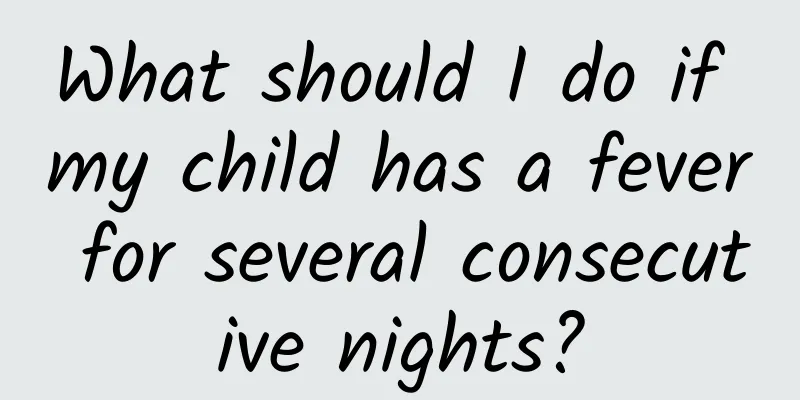What should I do if my child has a fever for several consecutive nights?

|
It is quite common for children to have continuous fever. Fever is a way for children to resist infection. At this time, we should promptly understand why the child has a fever, whether it is due to a cold, pneumonia, or some other disease. If the child's fever is below 38.5 degrees, some physical cooling methods can be used, such as cold compress. If the child's fever exceeds 38.5 degrees, medication should be used to reduce the fever in time. What should I do if my child has a fever for several consecutive nights? 1. When the body temperature is below 38.5℃, physical cooling is the preferred intervention. Fever is the most common symptom of infectious diseases in children. The treatment of fever can be roughly divided into "physical treatment" and "drug treatment". Generally speaking, when a child's body temperature is below 38°C, there is no need to use drug treatment, but choose the correct physical cooling method. For example, applying a fever-reducing patch, drinking plenty of water, and taking a warm bath can all help lower body temperature. 2. Infants and young children with a body temperature above 38.5°C need drug treatment. If you find that your child's body temperature has exceeded 38.5℃, parents should closely observe the child's condition so as to respond in time. For infants and young children, when their body temperature exceeds 38.5℃, they need to be given medication. 3. If the body temperature is above 39°C, medication should be taken under the guidance of a doctor. When a child's body temperature exceeds 39°C and is considered a high fever, Western medicine treatment is usually chosen. Currently, ibuprofen and paracetamol are commonly used antipyretics in clinical practice. These two types of drugs are relatively safe. But one thing must be made clear: parents should use medication under the guidance of a doctor, especially pay attention to the dosage, and send the baby to the hospital for treatment in time. Why do children have repeated fevers? Because children have poor ability to adapt to the external environment and their immune systems are not yet fully developed, any discomfort can easily lead to fever symptoms, or their body temperature may rise again quickly after taking medicine to reduce the fever. Especially in the hot summer, if parents use the air conditioner improperly or the baby drinks less water and cannot adapt to the high temperature weather, it will cause repeated fever. There are many causes of fever: mainly bacterial and viral invasion, which cause respiratory and gastrointestinal infections and lead to fever. What parents can do is to provide adequate nutrition according to the child's age and physical development, and add complementary foods in a timely, reasonable and balanced manner. Parents should be especially reminded that if their child has a fever for more than three consecutive days without improvement or if the baby has a high fever or convulsions, they should seek medical attention in time to identify the cause and provide symptomatic treatment. |
<<: Reasons for delayed speech in children
>>: What to do if your child has constipation and hard stools
Recommend
What is the best way to drink ginseng?
It is better to soak ginseng, astragalus, dried g...
Can garlic cure psoriasis?
Garlic is a folk remedy for treating psoriasis. W...
Focal low-grade squamous intraepithelial lesion
Most women are affected by gynecological diseases...
Symptoms of brain tumor in 7-year-old children
Brain tumor is a common brain disease that affect...
What is the reason for coughing
Cough is a disease caused by many reasons. If you...
What are some tips for treating colds and headaches?
It is quite common to have a headache when you ha...
Buttock bone pain
Although there is a lot of fat on the buttocks an...
Why do I still have dry mouth after drinking a lot of water?
In our daily lives, we will encounter many proble...
The efficacy and effects of Tribulus terrestris
Tribulus terrestris is distributed all over China...
What's going on if withdrawal bleeding lasts for 14 days?
For some people, pregnancy may occur due to carel...
What kind of leucorrhea is abnormal?
Abnormal leucorrhea is a relatively common sympto...
Summer skin pruritus
The weather in summer is hot and humid, and most ...
How to abort a child
Because of unexpected pregnancy, many people are ...
My wrist hurts, what should I do?
In daily life, we will encounter many bumps and b...
What are the functions of sweat steaming?
In daily life, we not only need to regulate our d...









